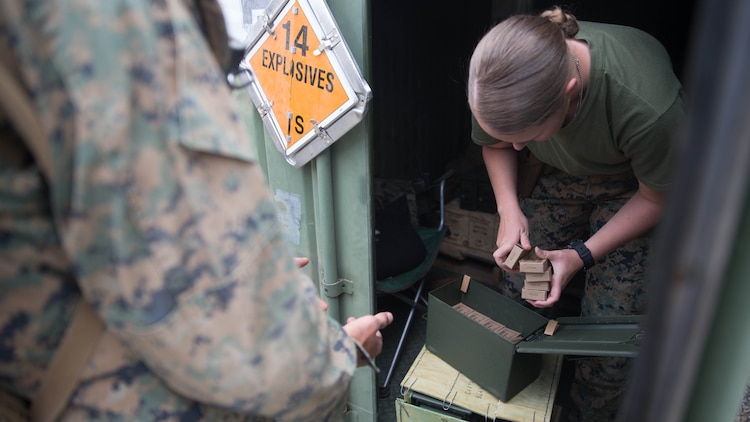By Kaitlin Kelly, Marine Corps Systems Command
MARINE CORPS BASE QUANTICO, Va. -- But this summer, a team
at Marine Corps Systems Command launched an upgrade to its ground ammunition
inventory system, allowing for greater collection, storage and interchange of
data. The enhancements to the Ordnance Information System - Marine Corps, or OIS-MC,
also ensure audit readiness to meet federal standards.
The ammunition program team at MCSC maintains accurate
inventory of all Marine Corps ammunition, and ensures Marines are always ready
for the fight with the right ammo at the right time.
“This platform provides seamless integration of data between
all of the military branches,” said Scott Rideout, program manager for
ammunition at MCSC. “We are using more complex accounting principles, and this
real-time processing of data helps reduce errors and accurately evaluate our
inventory.”
This month, the team is using the platform to report a
mandated audit to the federal government and work to achieve Financial
Improvement and Audit Readiness (also known as FIAR). FIAR helps federal
organizations compile successful financial statement audits by using the
methods of financial statement auditors. Following the FIAR method maximizes
the potential for accuracy to meet government standards by defining key tasks,
underlying detailed activities and resulting work products that all reporting
entities should follow to become audit ready.
“The DoD standard for reporting ammunition is you have to be
95 percent accurate,” said Dennis Zarnesky, director of Inventory Control
Point. “It’s extremely important that our reporting is thorough because the
more accurate we are, the more efficient our process is and the better business
decisions we make. That’s what audit readiness is all about.”
ICP, which falls under the ammunition program within MCSC’s
Logistics Combat Element Systems, consists of Inventory Management and Systems;
and Plans, Analysis, and Evaluation. Both branches work together to record
everything in the Corps’ inventory, including items that are consumed, shot or
disposed, such as small arms, mortars, artillery, rockets and missiles. Thanks to
OIS-MC technology, recording inventory is easier, which helps ICP better serve
Marines.
“We are a small group of civilians, Marines and retired
military, including retired ammunition Marines, who take this job seriously and
have an incredible sense of commitment and ownership,” said Zarnesky. “We know
what it’s like out there in the field because we used to have that same job.
Ultimately, we don’t want to let down the Marine who needs that ammunition.”
With a continued focus to increase combat readiness and free
up scarce resources for critical training and operations, ICP uses OIS-MC to
track the proper issue, accountability, upkeep and disposal of ammo on a daily
basis. Instead of sifting through thousands of transactions and records each
quarter, the platform provides everything down to the lot and serial number. If
there’s an error at one of the 160 locations that track and disseminate ammo,
the system can reveal that, Zarnesky said.
Efficiency and accuracy are the keys to reach audit
readiness, and OIS-MC is a key piece improving ammunition auditability, Rideout
said.
In the future, analytics and intelligence features will be
added, and the team will continue to improve the OIS-MC with new upgrades.
“The goal is for everyone in the Marine Corps who has
rights, from the Commandant and below, to be able to press a button and
instantly get the information they need in future updates of the OIS-MC,” said
Zarnesky. “We strive to get 100 percent accuracy rates with these future
improvements to the system, and I’m confident we can do it.”









No comments:
Post a Comment